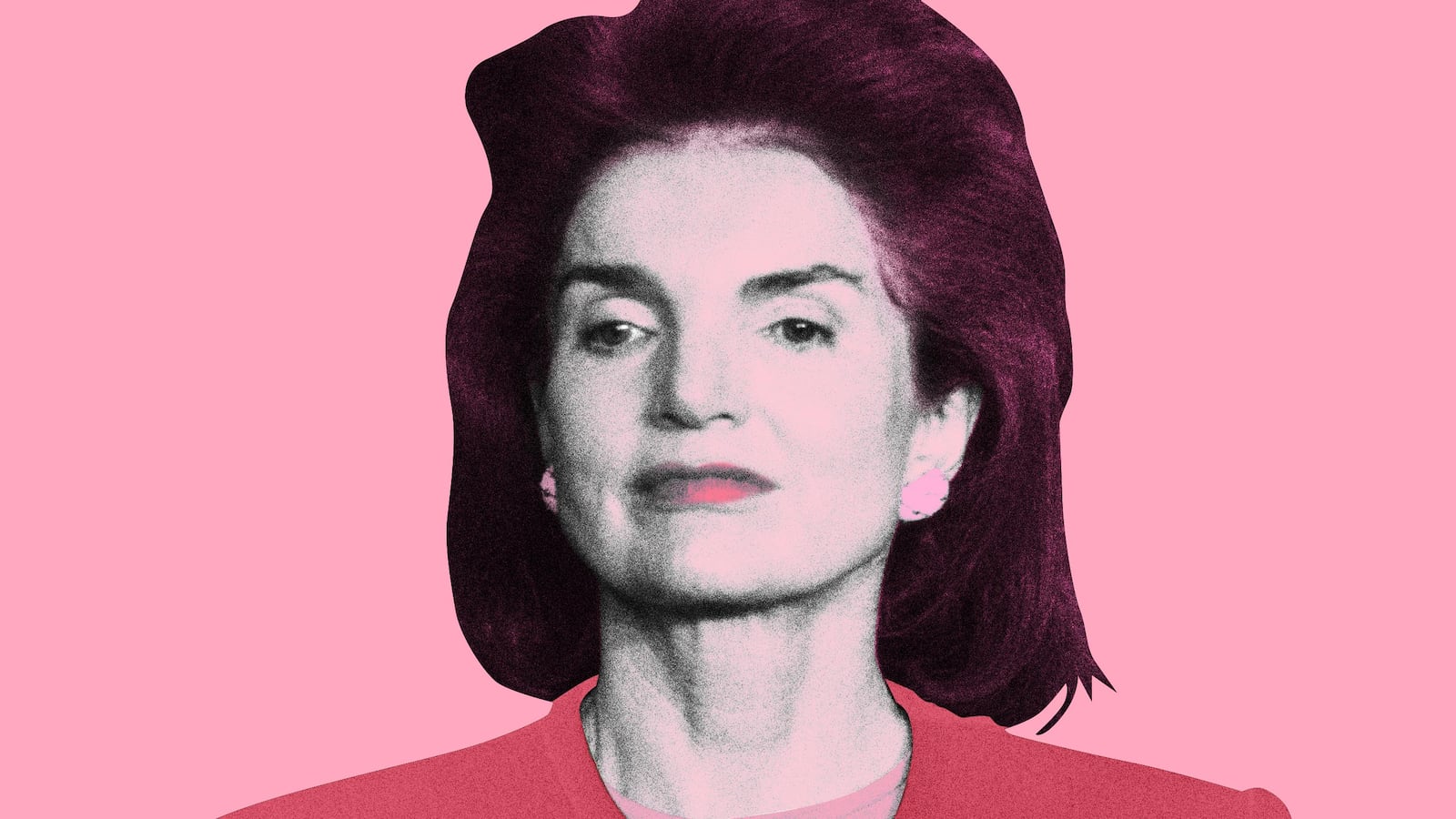Thursday, July 6, 1989
Quogue
I love how New York changes so completely in the summer. It’s my favorite time of year here, sitting at my wooden desk before the open window with the cool sea breeze.
The August issue arrived by FedEx. The Jackie O cover story, and Michael Milken’s rise and fall by Marie, is a much more commercial combo than July. To generate some summer heat I assigned Ed Klein to do Jackie to mark her sixtieth birthday. I asked him because he was always going on about how she liked him when he edited The New York Times Magazine. “What did she say when you called her?” I’d asked.
“She said, ‘Oh, Ed, give me a break,’” he replied. Ed is so totally impervious to social temperature that he took that as his cue to barrel ahead. But then again that’s probably his value. Jackie has every writer in such a stranglehold of sycophancy and terror, it takes a journalistic Clouseau like Ed Klein to get a cover story that everyone nonetheless will want to read at the beach. Just before we were going to press I glimpsed the Life August issue and was dismayed to see they had a very similar cover image of Jackie and it was too late to change ours. But not too late to change our cover line. Originally we wrote, “The Other Jackie O,” which was such a lazy, predictable effort I don’t know how it survived our critical disgust. The tension of necessity can often produce more creative solutions. In a surge of irritation with all the Jackie hagiography, I changed it to “Jackie, Yo! You’re rich, you’re gorgeous, and along comes Maurice!” (Tempelsman, her boyfriend.) It leapt out of the FedEx bag with good attitude.
Saturday, May 18, 1991
Gave a book publishing dinner for Clark Clifford’s memoir, cowritten with Dick Holbrooke, that Harry is publishing at Random House. Twenty years from now I will look back on it with fascination.
The whole atmosphere of the dinner was glowing with dated power. Here was Clifford, in his eighties—one of the most distinguished figures in American politics, patrician wise man to Presidents Truman, John F. Kennedy, LBJ, and Jimmy Carter, publishing a book that should be his legacy victory lap, and instead he’s in the middle of the BCCI banking scandal, facing charges of fraud, conspiracy, and taking bribes, a furore that has broken over his head at the same time as the pub date of this long-awaited book. He claims he was “duped” by his partners over BCCI, but the reality was probably a rare error of judgment fueled by latent character weakness, a love of power and reward that has increased as he loses relevance and believes his own legend.
An extraordinary assembly of mostly Camelot survivors convened to celebrate this ancient, elegant politico who’s right out of one of Gore Vidal’s novels. (“Will there be remarks?” he inquired as we sat down to eat.) And his own “remarks” were some of the best I have heard, a reenactment of a party thrown by a “dry” senator twenty years ago at which “those who usually had one drink before they got there had four, those who usually had six had eight,” the result being that all the senator’s guests arrived half-drunk, and Clifford proceeded to act out each of the half-drunk senators’ toasts—with full body-movement and speech content—to such a hilarious degree that the entire room was howling. It’s probably a routine he’s done many times but it was astounding! A good thing the DA wasn’t here, given his BCCI defense is that he can’t remember.
The arrangement of this dinner had given me much anxiety. Holbrooke, in his incorrigibly pushy way, kept inviting extra people and our dining room only seats sixteen for a seated dinner of two tables of eight, or at most thirty if we do buffet and five tables of six. This clearly was not a buffet crowd. Octogenarian Camelotters and the most famous first lady in history have to be properly respected. But as guest after guest accepted, it seemed a buffet for thirty would be unavoidable (though I still place-carded it). Was particularly worried about Jackie Onassis, who has never been to our house. I knew after the VF cover story “Jackie, Yo!” she would ruminate long and hard about accepting this, and would only do so for Clifford. Our piece, although very “pro” her, was pretty vulgar and intrusive. There is no doubt she hated it. And only two issues ago we ran the juicy Marilyn Monroe extract from the Peter Lawford bio, which had pull-quotes about JFK having sex with Marilyn.
How would she react to me after the gracious introductions? I would find out in a wonderful, subtle put-down she aimed at me, unforgettable in its deft and understated malice.
In person Jackie has an enormous head and a fragile presence. At dinner she and I sat close to each other because we were on either side of Clifford. The rest of the table was the historian Arthur Schlesinger, whom I sat beside her for the comfort of an old friend in a strange house, Victoria Newhouse, Ambassador Philip Habib, and the fabled speech writer Ted Sorensen. Watching Jackie close up was mesmerizing. Her face is always slightly out of whack with her expression, as if they are two separate entities at work. She has perfected a fascinated stare. Sitting finishing-school upright in a fuchsia Carolina Herrera jacket over a dark sheath, she looks into your face, not your eyes, and not mine, I hasten to say. In fact, “crazed” is what I decided about Jackie by the end of the evening. I felt if you cleared the room and left her alone, she’d be in front of a mirror, screaming. Her responses are so out of kilter. After thirteen minutes of a rapt stare, she suddenly claps her hands and cries in that breathy little voice, “Oh, Clark! You sly fox, you! The way you, the way you . . . dispatched Eisenhower! In that sly, slinky, oh, Cliffordy way! All the, all the, revisionism about Eisenhower! Oh, Clark, I don’t know about it! You know how we all . . . when we leave office . . . we’re dumped on. And then we, then we come back and it’s all written over again! Oh, Clark! What you wrote was so, so perfect!”
These disjointed outbursts came like a rush of animation from a puppet. It’s as if somebody jerks the strings, the body lurches to life, then she gradually sinks back into starey-eyed repose. But on to the put-down. Halfway through dinner, Arthur Schlesinger began to praise our Mrs. Thatcher profile by Maureen Orth. He was telling Habib he should read it, and Clifford, who amazed me by being a solid VF reader from all his references, agreed that it was first-rate. Jackie listened to all this, then suddenly turned to Clifford and said, “Oh, Clark! There’s a wonderful piece in this week’s New Republic you must, must read!” I knew instantly what she was referring to; the savaging of Gail Sheehy’s Gorbachev book by Tatyana Tolstaya, ridiculing all the alleged inaccuracies. Everyone knows that Sheehy’s Gorbachev book derives from her hit cover story in Vanity Fair. She went on, “Clark, Clark, I will send you this piece because you’ll die laughing. It’s about this, this naive American girl journalist, who’s oh so culturally ignorant about the Soviet Union that she applies her, her limited, silly Western views and logic to all the mysteries of the modern Soviet state!” As soon as I saw her game I broke away into a conversation with Habib while listening to her with one ear and catching her delicate sideways look to me across the salmon puff pastry, a look that registered she knew I knew she was shafting me and why. It was masterful.
Still the evening was a magical one, the casualness of it, the small tables and the careful seating worked so well. I shall never forget the vignette of Clifford sprawled on our big green round club chair after dinner with his long, spindly legs extended and Jackie kneeling at his feet, looking up at him. A nice surprise was her longtime escort Maurice Tempelsman, whom I had always filed as plodding and dull but who on this night was enormously warm and charming. After (delicious) rhubarb pie and coffee, Jackie floated around the room to stare into other faces and for a time sat nose to nose on a sofa with Clark’s wife, Marnie Clifford, who Harry said was divine. She seemed as happy as she is likely to get.
The next day Holbrooke told me Jackie called and said, “Oh, Dick, wasn’t it the most wonderful night! It was like the evenings Jack and I used to have at the White House! Distinguished and powerful men! Beautiful women of accomplishment! Dick, Dick. It was just like an evening at Versailles!” Which compensated for the fact that she tellingly and, I am sure with considered forethought, didn’t write me a thank-you note.
America, as with everything else, makes you more professional about entertaining. In London we just threw fun parties. Here one sees what works and formats it, so that each dinner is the dress rehearsal for the next one. In our case, the small tables, the long cocktail hour, the fast service, and the mobile dessert and coffee mean no one is stuck with anyone too long. I can’t talk to a dinner partner for more than twenty-five minutes a side without desperation setting in. No one has more than that to give, in my view, unless they are having an affair with the person next to them. And the guests seem to love it. Plus, having the dining room double as the library, books floor to ceiling, makes it all feel much cozier and more intimate.
I reflected afterward that had Jack Kennedy been alive, Clifford would have been the man Jackie turned to to handle her divorce from Jack.
Maybe some of these thoughts were in Jackie’s head as she carried her strange, tight stare away into the spring night.
Excerpted from The Vanity Fair Diaries, by Tina Brown, (c) 2017. Published by Henry Holt & Co.






